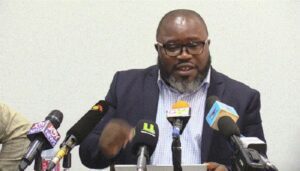Executive Director of Africa Education Watch (Eduwatch), Kofi Asare, has suggested the prioritization of a variety of servicing recommendations for the tablets supplied to students under the ‘One Student, One Tablet’ initiative to prevent interruptions to the students’ learning experience.
He stated that holding parents accountable for damage to the tablets will foster good care for the gadget by pupils.
“The key issue for us, as part of the learning process, is the maintenance culture. If parents appreciate that they have a role to play when their children destroy laptops, that they will have to pay, then we are all playing our key responsibilities.
If parents are aware that on vacation, their children will bring their laptops, their tablets home, and when destroyed, they’ll have to pay for fixing them, and they do so when it happens, because it will definitely, you know, not be out of the blue for it to happen, then we are all being responsible for supporting the policy’s implementation, “ he stated.
Kofi Asare stated that it is crucial that the company that supplied these tablets, KA Technologies Ghana Limited, responds promptly when damages occur during warranty period.
“There’s a one-year warranty on the tablets. When any damage occurs to the tablets arising from within the scope of the warranty, we expect that the company that supplied the tablets should respond timely to ensure that the children are able to immediately restore access to textbooks and other learning content, because this is not just a tablet. It’s a textbook. It’s a resource material.
It has various content that students will be using to learn, and they can’t afford to lose it for more than a day. And everyone who plays a role in the maintenance of the facility, you know, must be up and doing it. The President mentioned that there’s a telephone line or a 24-hour call service whenever there are technical issues, one can call on,” he further explained.

He suggested, speaking on TV3’s Ghana Tonight on Monday 25th March 2024, that creating district-level solution centres for support and maintenance would be helpful. He also suggested the training of ICT coordinators and tutors in senior high schools to resolve hardware issues that may evolve to create a seamless learning environment for both teachers and students.
“I think that it will be prudent to have district-level solution centers where when hardware issues emerge, we’ll be able to provide real-time support for the maintenance. Because now, teachers have laptops, and the students have tablets, and so in a district of two senior high schools, you’re likely to have about 5,000 tablets and laptops on government program. So, we need to think about investing in permanent systems that provide maintenance support. Alternatively, we can look at training the ICT coordinators and tutors in the senior high schools,” he emphasized.
He also mentioned that the policy is being continuously analysed to ensure excellent service is delivered to avoid past mistakes.
“The procurement issues are a matter of public concern. And rightly so, while the taxpayers’ money was used, it shouldn’t be difficult to find the procurement information from the Ministry of Education. We are interested in the value for money. We are interested in spending efficiently and most importantly, we are interested in quality service delivery. And so, with the information we are getting, I can assure you, we have already started monitoring the project.
We started monitoring the project two months ago when simulations were being done, when training of the ICT tutors in the senior high schools was taking place. We know what came out of the RLG and then the basic school laptop programs of the past very well. And guided by that, we are interested in monitoring closely how this program was implemented, so that we don’t arrive at the conclusions that we arrived at under the RLG program.
We must be sure that the 1.3 or 1.4 million tablets that are supposed to be procured have been distributed, have been received, and are being used for the intended purposes in terms of quality and everything,” Dr Asare stated.
By Jazmin Asumadu


